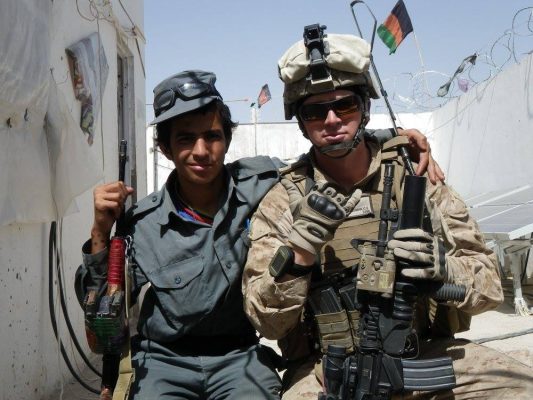MSSA helps Marine find camaraderie and support at Facebook
Gary Lehman has always been interested in the life of a warrior—not just the tactics, but also the mindset. In high school, he studied Aikido and delved into its philosophy and underlying principles.
Around that time, his father gave him a copy of Jarhead, Anthony Swofford’s firsthand account of the Persian Gulf War. Reading it gave Lehman a new appreciation for the U.S. Marine Corps and what they stand for.
“Until that point, I didn’t have a good understanding of what the Marines were about. In high school, I always saw these Junior ROTCs polishing their boots and doing inspections,” says Lehman. “I didn’t want any of that. But after reading Jarhead I realized that the culture and camaraderie I’d been looking for was sitting right there.”
Soon after, he enlisted in the Marines, ready to do his part on the frontlines. Instead, he was selected right out of boot camp for the Presidential Support Program, which trains Marines to provide security for facilities and government dignitaries in Washington, D.C., and surrounding areas.
For three years, Lehman served in D.C. and Maryland, including 18 months at Camp David. In 2011, he was deployed to Afghanistan for a seven-month tour training the Afghan national police on different techniques. Upon returning, Lehman was stationed at Camp Pendleton, where he served as an infantry squad leader, platoon sergeant, and range chief of Edson Range.

His transition date was just over the horizon when his commanding officer recommended Microsoft Software & Systems Academy (MSSA), an 18-week technical training and career development program that Microsoft offers to veterans and transitioning service members. After talking with two Marines who were just wrapping up the program, Lehman became convinced that MSSA would be a good fit for him.
“I had no idea where my future would lead when I started the Presidential Support Program, but I knew that I would come out the other side as a highly trained warrior. My perspective on MSSA was much the same: It would be challenging and force me to push myself to the limits, but it was designed to give me specialized skills that would set me up for success outside the military.”
Through the Presidential Support and Police Advisor programs’ vetting process, as in boot camp, Lehman had grown accustomed to a high level of autonomy and trust that he possessed the maturity and ability to take care of himself. Consequently, he was pleasantly surprised by the extensive amount of support he received through MSSA and its partners.
Lehman says he’d never considered a career in tech, but “from time spent in the classroom with instructors, to hanging out with my mentor in Redmond, Wash., or learning from fellow cohort members—the support I received through MSSA really dispelled any of the fear around that transition.”
Beyond the wealth of mentorship, training, and camaraderie already built into the MSSA program, a Jobplex career development specialist equipped Lehman with the skills to develop a professional resume and prepare for job interviews, and helped track down leads.
A few days before transitioning out of the Marines, Lehman was invited to Facebook for a full day of interviews. He was skeptical about his chances of being hired, but the time he’d spent researching the company paid off. He answered the interview questions with confidence and clarity and, while at the airport awaiting his flight home, was rewarded with a promising sign.
“There I was, ‘thumb-jamming’ thank-you notes on my cell phone when I got a call asking for references. I was super-excited, but had to keep it together in the airport.”
Today, he is a site reliability specialist at Facebook. On any given day he’s either working to remedy large-scale bugs that affect high volumes of Facebook users as quickly as possible or collaborating with internal teams to ensure their products are reliable.

One of the first things Lehman noticed was that Facebook’s core values are very similar to the Marine Corps’, and he’s seen a tremendous amount of support and camaraderie within the company. Since starting in his role, Lehman has joined a veterans resource group and taken up new hobbies including archery and Dungeons & Dragons, thanks in large part to team activities and employee Facebook Groups that allow him to swap tips and tricks with colleagues. Many of these groups include his team’s cross-functional partners, which helped smooth the transition and expanded his sense of esprit de corps throughout the workplace.
“From the get-go, the onboarding was incredible. There was great assistance moving me up to Menlo Park, and emails from my manager offering whatever assistance I needed.”
Felipe Buzaid, Facebook’s Veteran Engagement and Recruiting Program Manager, says that the company, “builds products to bring the world closer together, and veterans’ values and experiences are a key part of helping us achieve that mission.”
“We’re a proud supporter of the military community and are committed to ensuring Facebook is a place where veterans can find valuable opportunities, draw on their unique skills, and achieve real impact,” says Buzaid.
That commitment has been clear to Lehman since his first day on the job, and after two years in his role he feels lucky to be part of a tight-knit team where everyone helps one another improve and challenges each other to be better.
“Looking back, I guess I figured that after separation I would be flying solo and my support networks would be gone. But the assistance I received from MSSA and Jobplex, and the resources at Facebook, gave me a whole new perspective on camaraderie and life after the Marines,” says Lehman.
